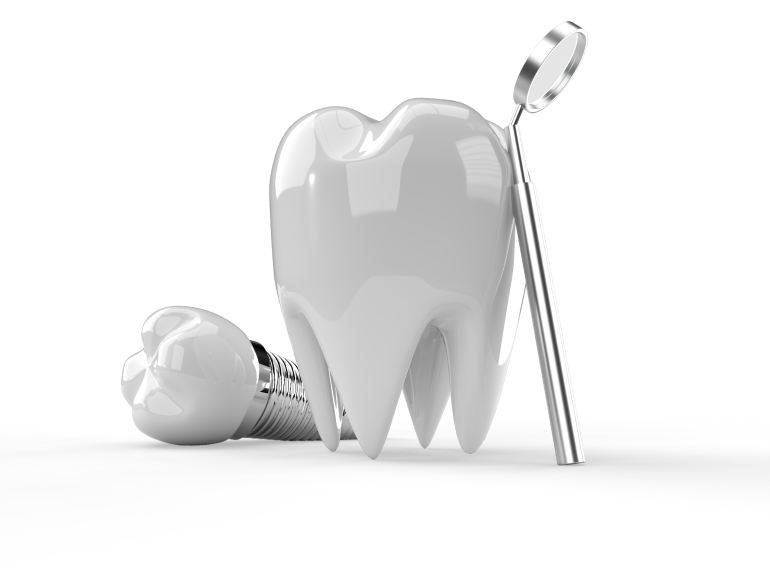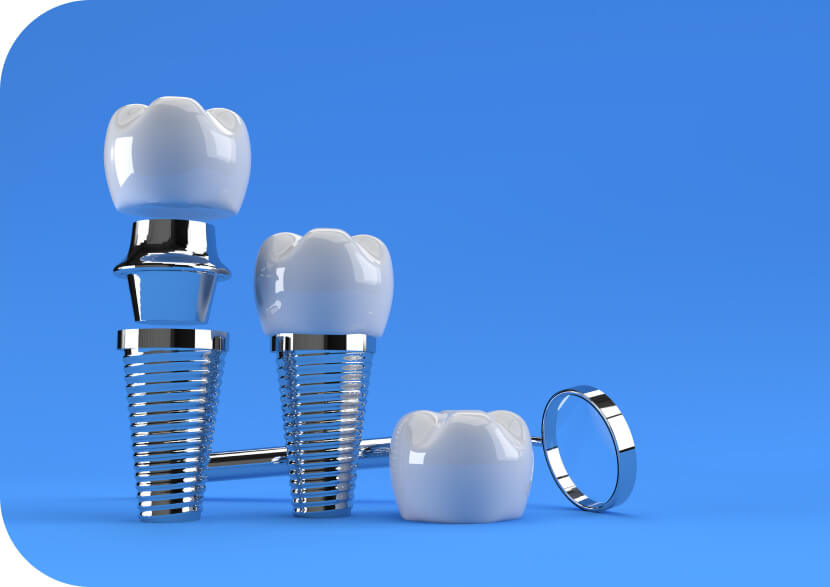PERMANENT SOLUTIONS
WITH IMPLANTS
WHAT IS IMPLANT TEETH?
WHAT ARE THE TYPES OF IMPLANTS?
The most well-known type of implant applied by dentists is the “screw implant”. However, there are many types of implants used in implant treatment. The type of implant is decided according to the region where the implant is placed, the health status of the jawbone and the type of implant to be used according to the bone tissue. Some implant types can be listed as follows;
· Endosseous Implant: It is a preferred type of implant in cases where one or more teeth are lost. It is a type that is applied by placing it inside the jawbone and is the most preferred type of implant. It has three different models. These models are;
– Screw implant
– Cylindrical implant
– Blade implant
· Subperiosteal Implant: It is a type of implant that is applied by measuring over the dental bone. The most important advantage of this type of implant is that it transmits the chewing force to the entire jaw.
However, this type of implant is not preferred much.
· Transosseous Implant: In this type of implant, it is among the type of implant treatment applied to the entire jawbone. This variety is a preferred species due to the deficiencies in bone length. This type of implant is not preferred much, because it is a very laborious and difficult type to apply.
· Intramucosal Implant: The implants used here are titanium veneers. It is not the most preferred type of implant today.
· Endodontic Implant: This type of implant is preferred for the hardening of weak teeth. Thanks to this method, a strong dental infrastructure is created.
ADVANTAGES OF IMPLANT TREATMENT
The advantages of implant treatment can be listed as follows;
· Excellent appearance; Dental implants have a natural appearance like the patient’s own teeth. It is a permanent treatment method as it fuses with the bone.
· Fluent speech; In patients who use unsuitable dental prostheses, these prostheses can slip in the mouth and this can prevent fluent speech. However, since the implant treatment is fixed to the chin with the help of screws, it does not prevent fluent speech.
· Excellent tooth root; Since it is applied in a way to fill the tooth root cavities that occur after tooth loss in implant treatment, the patient may have a near-perfect tooth root.
· Ease of eating; Since dental implants function like the patient’s own teeth, they also provide convenience in eating.
· Confidence; Since dental implants support the smile design, the patient’s self-confidence is restored, as they give the patient an aesthetic smile.
· Durability; Implants can be used for a long time, even for a lifetime, as long as oral hygiene rules are observed.
TO WHİCH PATİENTS IMPLANT TREATMENT İS NOT APPLİED
Although implant treatment can be applied in many known cases, implant treatment cannot be applied in some cases. Some situations are not considered suitable for applying dental implant treatment. These situations can be listed as follows;

If the patient has received radiotherapy treatment from the head and neck region in the past,

If the patient's jawbone continues to grow day by day, that is, if the jawbone has not completed its development,

If the patient has heart diseases,

If the patient has gum problems,

Cigarette use, which affects the rapid healing of wounds in the mouth,

If the patient has chronic diseases such as diabetes and high blood pressure,

If the patient has diseases such as autoimmune (immune system diseases) and hemophilia (blood not clotting as it should),

If the patient has a bone condition Implant treatment is not applied to such patients.
DO PATIENTS EXPERIENCE PAIN DURING IMPLANT TREATMENT?
Before the implant treatment, the patient can be prevented from feeling pain or ache by using mostly local and in some cases general anesthesia methods. Therefore, the patient does not feel any pain or ache during the surgical procedure. In patients undergoing local anesthesia, mild pain may occur as the effect of anesthesia begins to wear off during the day. These pains are considered normal by dentists.
HOW LONG DOES IMPLANT TREATMENT TAKE?
Implant treatment is a gradual treatment method. Each treatment phase is completed in different processes. These processes and the time they will take can be summarized as follows;
1- Examination; It is the first stage to be interviewed for the analysis of the patient’s general oral condition, whether the jawbone is suitable for implant treatment, and may take approximately 45 minutes.
2- Operation; The operation time may differ according to the number of missing teeth to be added to the implant. However, if we generalize this process, it can range from 30 minutes to 90 minutes.
3- Recovering Process; The fusion process of the bone and the implant screw may differ between 3 months and 6 months, depending on the structure of the jawbone and the fusion of the implant with the jawbone.
4- Placement of the Upper Structure of the Implant Tooth; While the first part of the dental implant treatment, which consists of two separate parts, is placed on the jawbone, the second structure, called the upper part, is placed inside the screw applied to the jawbone.
5- Placing the Implant Prosthesis; The last step, the placement step of the prosthesis, is completed by placing the prosthesis prepared according to the superstructure and its compatibility with other teeth.
FREQUENTLY ASKED QUESTIONS
What kind of oral care should I apply after the implant is made?
Can teeth be brushed after implants?
How long after implant treatment can food be eaten?
Will there be swelling / bruising on the face after implant treatment?
Is a single ımplant required for every lost tooth?
Do Materials used in implant treatment cause cancer?
WHY US?

Dentists & Our Specialists

Success Performance in Treatments

Central and Accessible
Providing service on weekends
Modern clinic, state of the art equipment
In the busiest place of Istanbul

ACHIEVEMENTS

20 YEARS
EXPERIENCE

25.000 +
SMILLING PATIENTS

12.000
SUCCESSFUL OPERATIONS






